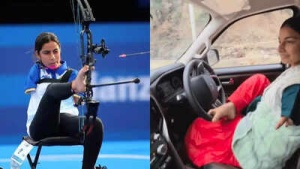Parenting is a complex journey with no universal blueprint. While parents often have the best intentions, their discipline methods can sometimes be extreme, ranging from shouting to physical actions. Unfortunately, these approaches aren't always effective. Disciplining children requires patience, a clear purpose, a well-thought-out plan, and cooperation between both parents. Many parenting techniques exist, and the "good cop, bad cop" approach is a popular one. This involves one parent acting as the strict disciplinarian ("bad cop"), while the other is more lenient and understanding ("good cop"). But is this method truly beneficial for raising well-behaved children? Let's delve deeper.

The "good cop, bad cop" technique originates from police interrogation strategies. One officer adopts a tough, demanding approach, while the other is understanding and empathetic. The goal is the same: to encourage the suspect to confess or acknowledge their mistake. In parenting, this translates to one parent setting and enforcing rules strictly, while the other provides emotional support and softens the impact of the discipline.
This division of roles may seem like a balanced approach, combining discipline with affection. For example, if a child misbehaves, the "bad cop" parent might issue a time-out or revoke a privilege. Meanwhile, the "good cop" parent comforts the child afterward, calmly explaining why their actions were wrong. This approach is often used to manage conflicts and maintain peace within the family.
Many parents naturally fall into this pattern, often unintentionally. One parent might spend more time managing daily routines and discipline, naturally assuming the "bad cop" role. The other, perhaps due to work commitments, becomes the "good cop," providing emotional support and fun moments for the child. This division can feel like a way to share parenting responsibilities and avoid constant arguments. This technique can also be gender-specific, with mothers often taking on the "bad cop" role and fathers the "good cop" role.
Furthermore, parents might believe this method helps children understand boundaries while still feeling loved and secure. The "bad cop" establishes limits, while the "good cop" ensures the child feels safe and understood.
While the "good cop, bad cop" technique might appear effective initially, experts and studies suggest it often creates more problems than it solves. Here's why:
Children thrive on clear and consistent rules to understand expectations. When one parent enforces strict discipline while the other relaxes the rules, children receive conflicting messages. In such a scenario, a tantrum might be punished one day but excused the next. This inconsistency makes it difficult for children to distinguish between right and wrong, leading to confusion and frustration.

Children quickly learn to exploit the "good cop, bad cop" dynamic. They realize that defying the "bad cop" might lead to the "good cop" mitigating the consequences. This encourages children to manipulate situations by playing parents against each other, becoming adept at this over time.
The "good cop, bad cop" roles can generate significant tension between parents, creating a divide. The "bad cop" might feel resentful for always being the strict one, while the "good cop" might be perceived as spoiling the child. This can weaken the parental partnership and lead to frequent disagreements.
Children tend to form stronger bonds with the "good cop" parent, who is seen as fun and understanding. This can leave the "bad cop" parent feeling rejected or emotionally distant from the child. Over time, this can erode trust and respect between the child and the stricter parent.
Research indicates that harsh or inconsistent parenting styles can contribute to stress, anxiety, and behavioral problems in children. A 2016 study from Iowa State University revealed that even when balanced by the other parent's leniency, harsh parenting can negatively impact children's physical and mental health, particularly at a young age. The "good cop" parent's kindness cannot undo the unintentional harm caused by the "bad cop" parent's strictness.
Instead of playing "good cop, bad cop," consider these strategies:
By working together and presenting a united front, parents can create a more stable and supportive environment for their children to thrive.
Newer articles
Older articles
 Evil Eye Amulet: Protective Charm or Portal to Dark Forces? A Cultural Debate
Evil Eye Amulet: Protective Charm or Portal to Dark Forces? A Cultural Debate
 Jayden Seales Fined by ICC for Provocative Gesture During Australia Test Match
Jayden Seales Fined by ICC for Provocative Gesture During Australia Test Match
 Paralympic Archer Sheetal Devi's Viral Video Shows Her Driving Car with Feet, Defying Expectations
Paralympic Archer Sheetal Devi's Viral Video Shows Her Driving Car with Feet, Defying Expectations
 Broad Slams India's Team Selection After Headingley Test Loss, Calls for Roster Tweaks at Edgbaston
Broad Slams India's Team Selection After Headingley Test Loss, Calls for Roster Tweaks at Edgbaston
 Umpire Controversy Erupts: West Indies Coach Sammy Questions Holdstock's Consistency in Barbados Test
Umpire Controversy Erupts: West Indies Coach Sammy Questions Holdstock's Consistency in Barbados Test
 Sachin Tendulkar: 1983 World Cup Win Sparked My Cricket Dream at Age 10
Sachin Tendulkar: 1983 World Cup Win Sparked My Cricket Dream at Age 10
 Jaiswal's Fielding Woes: Ex-India Star Kaif Points to Potential Cause for Dropped Catches in England Test
Jaiswal's Fielding Woes: Ex-India Star Kaif Points to Potential Cause for Dropped Catches in England Test
 Team India's England Tour: Rahul's Sleep Strategy, Coaching Rituals, and Coffee Culture Revealed
Team India's England Tour: Rahul's Sleep Strategy, Coaching Rituals, and Coffee Culture Revealed
 Suryakumar Yadav Successfully Completes Sports Hernia Surgery, Eyes Return to Cricket
Suryakumar Yadav Successfully Completes Sports Hernia Surgery, Eyes Return to Cricket
 Gujarat Cricket Set to Launch T20 League in 2025-26 Season
Gujarat Cricket Set to Launch T20 League in 2025-26 Season